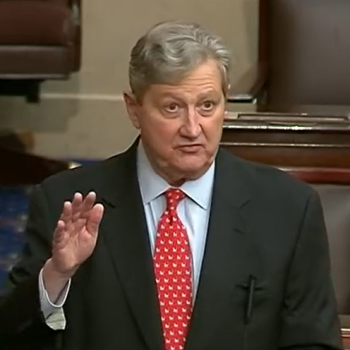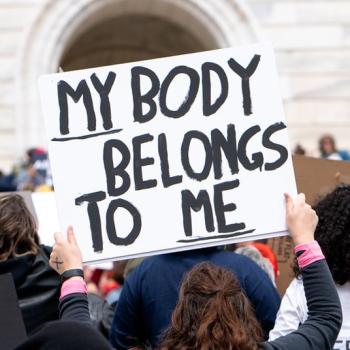Lucas Kwong, “‘Sanctified Sinophobia’ and the Role of Christian Nationalism in Anti-Asian Racism”
Christians have to go beyond making broad denunciations of racism and think, “What are the material networks of power and influence that my church is supporting, and how can I ally with other people who might not be pastors, who might not be deacons or people in positions of ‘influence,’ but how can we create a community that more accurately reflects that ‘priesthood of all believers,’ that ‘beloved community,’ in which hierarchy is replaced by an equal commitment to love and justice?”
… Some reflection is required, particularly for white evangelical Christians. I am a big believer that there are many people out there — and maybe this is optimistic — but I believe there are many people out there who simply have not connected the dots, who simply have not thought about the fact that, “Oh, I’m going to this church that, on one hand, has a diversity statement on its website, proudly features pictures of our Black, Latino, and Asian pastors or pastoral staff, and yet our most visible congregant and possibly wealthiest donor to this church is an unrepentant xenophobe or racist. I wonder what my role is, perhaps as someone who indirectly benefits from that system of mutual beneficiality? What is my role here to dismantle that relationship or to challenge it?”
Tressie McMillan Cottom, “Breaking Up With White Supremacy Was Always the End Game”
If you follow all the prescriptions of checking your privilege, unpacking your invisible knapsack, centering the marginalized, excavating your deeply held white supremacist notions and not becoming a Karen, you will absolutely positively have to break up with actual white people.
You will love many of those white people. You will be related to some of them. You will be married to them. You will, one day, be faced with pulling “whiteness” down out of the clouds and seeing it not in ideas but in people, written on bodies you have touched, scattered across relationships that have sustained you. You will see it in your family photographs and in the age spots of hands that reach for you. You will, one day, look across a table at the kindest sociopaths you have ever loved.
Ari Berman, “The GOP Plan for Minority Rule Marches On”
The Wisconsin saga showed how much power Republicans can exert without popular support, and it’s about to be replicated on a much larger scale. The violent invasion of the Capitol on January 6 drew rebukes from many Republican lawmakers. But it reflected, in extreme form, something Republicans have long displayed: a disregard for the will of the majority. With Republicans shut out of the White House and congressional leadership, minority rule is likely to intensify over the next four years in ways not seen in modern times.
Carol Anderson, “White rage won’t just go away”
White rage is the operational function of white supremacy. It is the fear of a multicultural democracy. It is predicated on a sense that only whites are legitimate Americans. So when I heard that language of “If you only count the legal votes and not the illegal votes coming out of Philadelphia and Detroit,” that was the signal that those votes coming out of the cities, which becomes like a synonym for where Black people live, are illegal by the very function that those voters are in the city. And so it is a way of crafting Americanness as white-only, like hanging a Jim Crow sign on it. And that, therefore, the rights of American citizenship are white-only.
Rabbi Danya Ruttenberg, “The right-wing Christian movement shouldn’t control the abortion narrative”
Too many clergy behave as though the conversation has already been ceded to those who claim that faith and religious practice are wholly incompatible with the belief that everyone has the right to decide what happens to their own bodies. Even in liberal, suburban Jewish communities where people talk a lot about tikkun olam (repairing the world, social justice), congregants are surprised to learn about Judaism’s permissive approach. Because we don’t talk about it.
And more to the point, abortion touches each and every religious community, regardless of whether it is officially sanctioned. One in 4 people who can get pregnant will terminate a pregnancy by the age of 45. And they live in every religious community, in every walk of life, even if it’s not always discussed. Renee Bracey Sherman, the founder of We Testify, an organization that focuses on storytelling around abortion, said, “Everyone loves someone who has had an abortion, whether they know it or not.”
Dan Froomkin, “What the next generation of editors needs to tell their political reporters”
First of all, we’re going to rebrand you. Effective today, you are no longer political reporters (and editors); you are government reporters (and editors). That’s an important distinction, because it frees you to cover what is happening in Washington in the context of whether it is serving the people well, rather than which party is winning.
… While we shouldn’t pretend we know the answers, we should just stop pretending we don’t know what the problems are. Indeed, your main job now is to publicly identify those problems, consider diverse views respectfully, ask hard questions of people on every side, demand evidence, explore intent, and write up what you’ve learned. Who is proposing intelligent solutions? Who is blocking them? And why?
And rather than obsess on bipartisanship, we should recognize that the solutions we need – and, indeed, the American common ground — sometimes lie outside the current Democratic-Republican axis, rather than at its middle, which opens up a world of interesting political-journalism avenues.
















